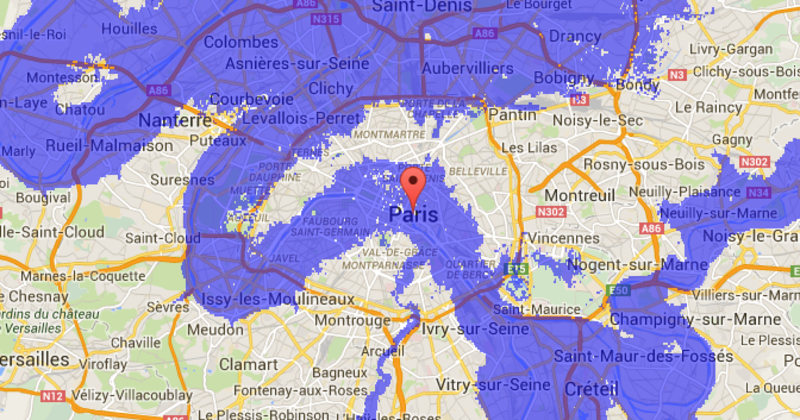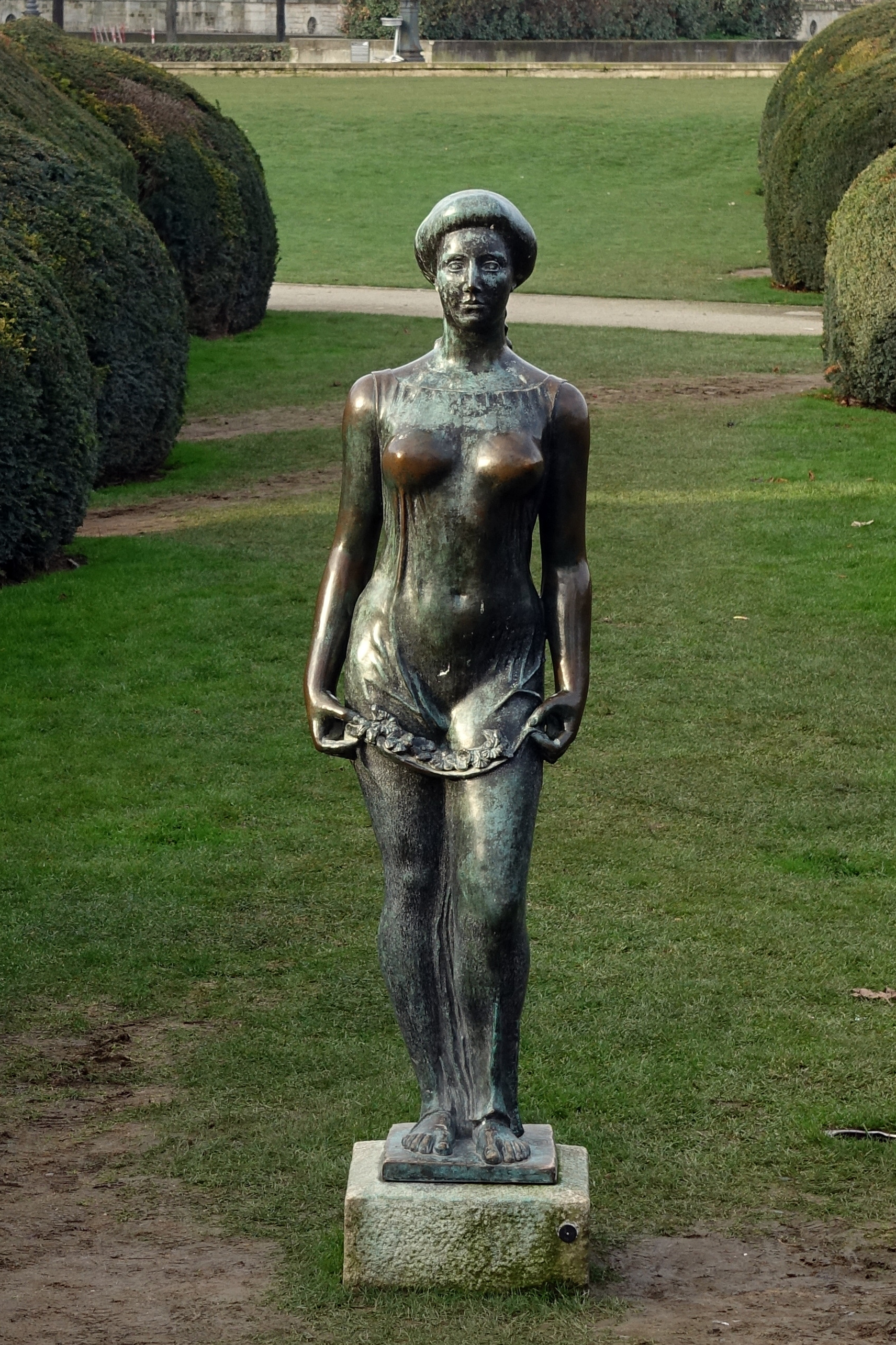Comments
-
The Essence Of WittgensteinTMF's statement does not need a context--that's been the point (above). Every word has a meaning, so no context is needed — Antony Nickles
That is not what I wrote. Try and pay attention, I hate repeating myself. I said that TMF's comment already had a context: that in which the comment was made. There was no need to try and find another context for it, other than you wanting to avoid dealing with TMF's point, that feeling is knowing. -
COP26 in GlasgowWhen I was a teenager I read a lot of scifi, including some who included sea level changes. Like Paris or New York under water.

In this simulation, Paris is mostly under water if sea level rises 50 metres, the level predicted to happen in 500 years or so, in the worst case scenario.
.jpg)
Cover art for: Valérian - La Cité des Eaux Mouvantes, by Jean-Claude Mézières, 1970
Yes to optimism but no to denial. This sub-genre of scifi (called Climate Fiction) cannot be all gloom and doom of course, and mankind may indeed still thrive. But the challenge cannot be ignored anymore, nor wished away via some future technology. -
COP26 in Glasgowhas anyone asked them ? — Amity
Young adult fiction says a lot. As I explained, a lot of nowadays scifi has a dystopian angle, which I guess helps kids and young adults prepare psychologically. In the US, the 100 is a good example. In Italy, there was Anna; in France, L'Effondrement. -
COP26 in GlasgowYou think you know how to disestablish capitalism? Tell us. — Bitter Crank
That's a very different question than CC. Capitalism is like gravity: you cannot escape it. My point was simply that people are only powerless against climate change when they want to be powerless. There's always something to do, including through your vote. -
The Essence Of WittgensteinWas it said as a philosophical conclusion, or as an example of the sort of thing someone might say, when not doing philosophy, that seems to make perfect sense? (Roughly, was it theory or data?) If it's a bit of philosophy, are any of the words there used in a special technical sense that it is not what people ordinarily have in mind when they use those words? And if that's the case, how to connect that usage to ordinary usage, so that our philosophical discussion is relevant? — Srap Tasmaner
It was data. TMF was only stating the obvious. "Having a headache" means "feeling pain in one's head". You cannot feel something like pain in your head and not know that you feel it.
He said so in a certain context, in response to a post pretending (absurdly) that "sensation is expressed, not known". And it made perfect sense in this context to retort: "when I have a headache, I know I have it".
To ask in response: "in what context would you say that?" appeared to me a disingenuous attempt to change the conversation, to escape the actual context of the sentence, to avoid having to face the sentence itself, because it is obviously true. -
COP26 in GlasgowI like Bernie, but it's not a "one man problem" -- it is a big complex systemic problem. — Bitter Crank
Many people like Bernie but not enough to ever vote for him. Instead, they voted for someone else, someone who looked more serious and less bizarre, someone who could be trusted to never lift a finger against corporations. And then they shed crocodile tears about how they can't change a thing by their vote... That's how the con works: you don't even try because you think you never had a chance. -
COP26 in GlasgowAs Uncle Karl said, "The government is a committee to organize the affairs of business." We The People are SOL.
We could have a revolution, of course, — Bitter Crank
Bernie could have done something useful I think. He's still trying. -
The Essence Of WittgensteinWell if that's not just facetious, it demonstrates Witt's point that we want to strip away any context and take a sentence in isolation to have met the standard we want for knowledge. — Antony Nickles
My point was that the sentence was expressed in a certain context: that of a philosophical discussion on TPF. There is no need to look for another context in which it could possibly be said. It arose here and this is the context where it may be meaningful. Look at the post it was replying to. That should be context enough. -
The Essence Of WittgensteinWhen I have a headache, I know I have a headache.
— TheMadFool
In what context would we say "I know I have a headache."? — Antony Nickles
Err... TPF? (considering @TheMadFool just said "I know I have a headache" right here...) -
COP26 in GlasgowThe stupid crass people and their kids never had a say in the future at any critical stage. — Bitter Crank
They do everytime they vote, though. Why vote for climate deniers or do-nothingers again and again? In the US, Bush and Trump were deniers, and Obama did nothing much while sabotaging international agreements. Biden, I don't know yet but I doubt he'll do anything. -
COP26 in GlasgowIt's more that people are taught to look at the future negatively and critically. Being optimistic sounds too much as being care free and not being worried about future. It isn't politically correct. — ssu
It's also not scientifically correct, and honestly, simply not credible. Trump is part of our reality, and scifi must reflect that sinister turn taken by our civilisation toward crass stupidity, ignorance of consequences and sadism. Strong, aggressive climate change is now certainly our future. People are just too stupid or too crass to change, and the kids know it. They can read the news just like adults can.
Optimism was perhaps the biggest BS you were made to believe in as a kid... -
The Essence Of WittgensteinDon't ask me. I'm just following the herd. — TheMadFool
Wittgenstein himself was incoherent, from what I can tell, so he can't help you out. -
The Essence Of WittgensteinDo not be proud on account of your knowledge
But discuss with the ignorant as with the wise
The limits of art cannot be delivered
There is no artist whose talent is fulfilled
Fine words are more sought after than greenstone
But can be found with the women at the grindstone
-- The Teaching of Ptahhotep
Attributed to the Vizier Ptahhotep who lived around 2375–2350 BC, the Instructions or Teaching of Ptahhotep are didactic wisdom literature belonging to the genre of sebayt (teachings). -
COP26 in GlasgowAnd how will the future generations do in America with the US? — ssu
One possible answer is in the second season of The 100. Another in Hunger Games. These echo (or try to) today's teenagers' views of the future as pretty bleak.
You couldn't do an optimistic scifi movie nowadays. Nobody would believe it. -
COP26 in GlasgowI could not agree more. But I think nobody is off the hook. Ultimately production follows demand.
-
COP26 in GlasgowThat will be making a virtue of necessity. — James Riley
Technology can help. Hydrogen-powered planes would be nice to have for instance, or fusion power.
But other things can help and should be made virtue of, such as frugality. Do we really need to eat meat everyday, to drive for hours everyday, or to fly every week (for some)? Do we want to? Being a bit more conscious and careful about what resources we consume would help. Not to say that people aren't; the idea of change via consumer information
and behavior change is gaining momentum. -
COP26 in GlasgowSo you were exposed to books critical of the US as a kid? Shocking! I don't know how you managed to survived such deep narcissic wound.
Climate change was already well studied and non-controversial when I was at school, in the 1970s and 80s. It was not propaganda at all; on the contrary, its denial was propaganda and still is. -
What is beautyI don't find it attractive. — Tom Storm
As I'm sure has been said many times already on this thread, beauty is in the eye of the beholder. Personally, I find the 'Flore' statue very attractive. The point was that these bronzes are there for the touching, that touching a sculpture is not out of place (unless it can damage it of course), but is in fact the best way to enjoy and literally grasp a sculpture. -
What is beautyI meant to respond to this sooner, but forgot.
You can also judge a pudding by its look. However, the real proof of the pudding is in the eating.1) Of course I can. Why can I not? — tim wood
Yes, you cannot touch those of course, too old and fragile. But to come back to contemporary artists like Rodin or Maillol, you can touch their bronzes without posing any risk to their work.the Riaci bronzes — tim wood
Maillol's sculptures are what we would call today "sexualized": beauty for him was also carnal. E.g. tits are typically erected. There are a few Maillol bronzes in the Tuileries garden in Paris, and people touch them all the time. Some body parts more than others, though, just like your husky... :-)

-
COP26 in Glasgow
Well, they do have anxieties about these issues, rightly so, and our inaction fuels these anxieties. Kids never fully trusted grown-ups, but now they have a very good reason to feel betrayed by grown-ups. Their future is sacrificed on the altar of the Almighty Dollar, Molloch style.I don’t want our children to have anxieties about these issues. — Guardian: Useless gestures from Corporate Social Responsibility -
The Essence Of WittgensteinCan we now claim that language has made its first tentative steps into our private worlds which until now had been hidden and beyond the reach of language? — TheMadFool
Our 'private worlds' are what people talk about all the time, what poetry and literature have been about for several thousands years. I will never understand expressions of stupor or bewilderment at the most familiar stuff of all: our own thoughts. How alienated from oneself can one pretend to be? -
The Essence Of WittgensteinThat's part of why I give the reference theory hell. — hanaH
I am aware of an English tradition criticizing correspondance but it never really went anywhere, from what I know, never crossed the channel in particular.
A few Cambridgeans and Oxfordians notwithstanding, words do refer to something, otherwise we would have no use for them whatsoever. They do NOT usually refer directly to particular objects but they refer to categories or sets of things. Like an "elephant" is (in first, literal meaning) a member of a certain mammal species. To my knowledge this is the current scientific (linguistics) view, it's not pre-scientific at all.
Of course the word "elephant" can be used for many other things, such as naming a London neighborhood, symbolising the Republican party in the US etc. Concepts have great plasticity.
directly but privately experienced. — hanaH
What is so shocking or strange about a private experience? It's what our life is made of. In addition, intimate thoughts, feelings and perceptions are the basis for all human knowledge. Discard them, and philosophy and science disappear. Witt should have read Husserl a little more. It would have grounded him better. -
The Essence Of WittgensteinIt gives philosophers a special domain, often take to be eternal and offering a kind of ideal, "direct" access. I "can't" be wrong about what I think I mean. I "can't" be wrong about my pain. This "can't" is more grammatical than logical ( — hanaH
I think it's simply false to assume that "I can't be wrong about what I think I mean." We are not fully transparent to ourselves IMO.
In Wittgensteinian, you don't necessarily know all the beetles you have. -
The Essence Of WittgensteinI personally have less problems understanding invisible things than visible things. Note that I'm avoiding the terms "physical", "material" and "immaterial" because I do not quite understand or trust what they mean. I do understand the distinction between visible and invisible, so that's what I use here.
So for me, speaking of ideas or concepts is not a problem at all, but speaking of visible ("material") things is sometimes more triky, as it involves "thinging" for instance. -
The Essence Of WittgensteinAbracadabra, an armchair science of the eternal essence of reality. — hanaH
Who was speaking of science, or eternity, or even reality? None of that has anything to do with the fact that words carry meaning, and that's why people use them.
If "meaning is use", then no meaning is no use. If words carried no meaning, people would have no use for them... -
The Essence Of WittgensteinI'm emphasizing the limitations of the any "referent approach" for understanding "meaning. " — hanaH
That doesn't lead anywhere though. Because what am I supposed to make of what you or Witt say if your or his words have no referent at all? -
The Essence Of WittgensteinI would need to see ‘the Augustinian picture' that the author is talking about in order to take position.
-
The Essence Of Wittgensteinis the doctor's pain the same as the patient's? That's impossible to divine. — TheMadFool
Yeah but why does it matter, as long as, assuming it's the same pain, things work? -
The Essence Of WittgensteinCode-> stand for, summon
Type-> category, set of things that are similar in some way
That there is a referential link between word and category of thing? — Joshs
Yes. -
The Essence Of WittgensteinHow would I know if my pain is the same as the doctor's pain? — TheMadFool
The doctor doesn't need to have a pain in the neck in order to inspect necks of people having a pain in the neck. -
The Essence Of WittgensteinI think it's moderately justified. I'd say that my issue is pretending that such an hypothesis is exactly right, or that it's without problems. Sensation words, as Witt shows, have some serious problems, at least if we hope to found a theory of meaning on them. — hanaH
Witt is playing in the dark and probably at the wrong game. All words are "sensation words" when you think of it. They all code for an idea of a thing, for a type of things, i.e. for a concept, not directly for a thing. The word "apple" codes for the idea of apple. -
The Essence Of WittgensteinWe learn to use the word "concept" in various practical situations, but I think it's like "law" and "justice." It doesn't have a referent, or at least I find such a claim problematic. — hanaH
The law exists alright, even if it cannot be seen or put in a portrait. And if concepts didn't exist, then we would have to replace this err... concept by a better one.
I mean, just because you cannot see something doesn't imply you can't feel or otherwise evidence its effects. The law has effects, I think. Your pain can have effects. A philosophy can have effects. In other words, imagining or postulating a philosophy (or a law) as an existing referent can be justified. -
The Essence Of WittgensteinInteresting post. — Banno
Didn't see that one. Thanks.
Just to close the loop, on the last pic with the scroll sign, the vertically-placed scroll follows after the shepherd hook scepter sign (here in blue and orange) = an ideogram meaning literally sceptre (HKA), as well as a K (the little blue hill) as some partial phonetics of HKA.

So our little scroll sign functions as a determinative for HKA, and here it points to the figurative sense, ie not a literal scepter, but a "bookish" or figurative one: the rule, the power.
You cannot see or depict power. So all they could do is draw a symbol of power - the scepter - and another sign saying "figuratively" - the scroll.
In context: "the rule of Osiris". Or if you prefer: "the figurative scepter of Oriris". Osiris being most probably what the big eye on the right stands for. The below glyph is damaged but it must be the throne sign, which together with the eye composes "Osiris". So the highest god is written down as an eye floating over a throne. -
The Essence Of WittgensteinBehaviorism is just nonsense.
1h — frank
Yes, clearly. Even for animals. -
What is beautyBeauty is superfluous. — GraveItty
Unless you can see the beauty of ugliness. There is a passage about that in Heinlein's Stranger in Strange Land, where an alien comes to earth and tries to understand human civilisations. One of the things puzzling him is human art, and how it can depict ugly scenes. The examples are drawn from sculpture, including Rodin:
A great artist—a master—and that is what Auguste Rodin was—can look at an old woman, portray her exactly as she is . . . and force the viewer to see the pretty girl she used to be . . . and more than that, he can make anyone with the sensitivity of an armadillo, or even you, see that this lovely young girl is still alive, not old and ugly at all, but simply prisoned inside her ruined body. He can make you feel the quiet, endless tragedy that there was never a girl born who ever grew older than eighteen in her heart . . . no matter what the merciless hours have done to her.

(Celle qui fut) la Belle Heaumière, by Rodin. -
The Essence Of Wittgensteinthe semantics (the beetle, the pain) "drops out of consideration". — TheMadFool
I don't see how it does. If you go and see a doctor about your pain in the neck, he will inspect your neck and maybe find something objectively wrong with it. -
What is beautyAn ugly scene can do just the same. Even more maybe. — GraveItty
Can you give an example?
Olivier5

Start FollowingSend a Message
- Other sites we like
- Social media
- Terms of Service
- Sign In
- Created with PlushForums
- © 2026 The Philosophy Forum
